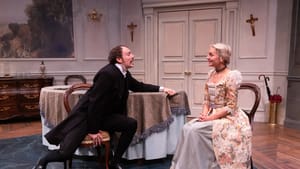Stay in the Loop
BSR publishes on a weekly schedule, with an email newsletter every Wednesday and Thursday morning. There’s no paywall, and subscribing is always free.
Scandals, scoundrels, and rhyme
Lantern Theater Company presents Molière’s Tartuffe

I'll get straight to the point: I loved the Lantern's new production of Molière’s Tartuffe (in the definitive 1963 English translation by Richard Wilbur). From the actors’ first entrance to the curtain call two-and-a-half hours later, I found the show to be achingly funny.
For those unfamiliar with the nearly 400-year-old French work, Tartuffe tells the story of a charlatan posing as a holy man (the eponymous Tartuffe, here the always-excellent Jered McLenigan) who has conned the wealthy Orgon (a delightfully physical performance by Frank X) into bringing him into his family home. In typical French farce style, there are lots of dramatic entrances and exits, hidden eavesdroppers, quarreling lovers, and wild misunderstandings. And the story unfolds in rhyming couplets.
A hilarious cast
McLenigan and X aren’t the only cast members who deserve recognition. Under director Charles McMahon, the whole ensemble (Morgan Charéce Hall, Gregory Isaac, Dave Johnson, Travoye Joyner, Lee Minora, Campbell O’Hare, Cathy Simpson, and Kahlil A. Wyatt) contributes just as much to the production’s success.
Johnson, who has far less stage time than many of his co-stars, had my fellow theatergoers in stitches just by coming onto the stage. Minora is perfection as the prototypical meddling maid, and her unvoiced, onstage reactions to Johnson and Hall’s squabbling lovers were proof that you don’t have to be a lead to enthrall your audience. And as Elmire, O’Hare, fending off Tartuffe’s increasingly unwelcome advances, shines in a role that can feel uncomfortable or even cringey in the hands of a less capable performer.
A work for the ages
As with Shakespeare, there’s no reason to require the farces of Molière and his contemporaries to be set in the time they were written as long as the setting makes sense.
The Lantern’s production is set not in the 17th century but during the Belle Époque (1871-1914), which, as dramaturg Meghan Winch explains in the program notes, is more than just an excuse to put the cast in s-bend corsets instead of mantuas: this era had quite a bit in common with Molière’s time. Political uprisings, the changing role of the Catholic church, and a heightened awareness of class divisions echoed some of the events from two centuries prior, so although the denouncement of Tartuffe involves the intervention of the French monarchy, and the monarchy was disbanded by the Belle Époque, it’s not unreasonable to transport the events to the turn of the 19th century.
Nor would it be unreasonable to transport the events to today. Not every work of art produced in the modern era must come with a link to the political or social climate, but it’s always fun to find those links in unlikely places, such as in a 359-year-old play. Tartuffe centers—and was, in fact, banned in the 17th century for—religious hypocrisy. The titular character holds himself out as a pious man, more studied in the bible and of higher moral character than others around him when the truth is all he’s actually doing is shaping a narrative that fits his version of reality and gives him more control. The reality is that Tartuffe is greedy, lustful, and power-hungry. He doesn’t care about holiness; he cares about himself. If that sounds like a certain Colorado congressperson recently caught on camera in flagrante delicto—or any number of moralizing politicians—you’d be forgiven for assuming the Lantern is sending a subtle message through this production.
What, When, Where
Tartuffe. By Molière, translated into English verse by Richard Wilbur; directed by Charles McMahon. $25-$40. Through October 8, 2023, at St. Stephen’s Theater, 923 Ludlow Street, Philadelphia. (215) 829-0395 or lanterntheater.org.
Accessibility
St. Stephen’s Theater is accessible only by stairs.
Masks are suggested, but not required.
Sign up for our newsletter
All of the week's new articles, all in one place. Sign up for the free weekly BSR newsletters, and don't miss a conversation.
 Jillian Ashley Blair Ivey
Jillian Ashley Blair Ivey